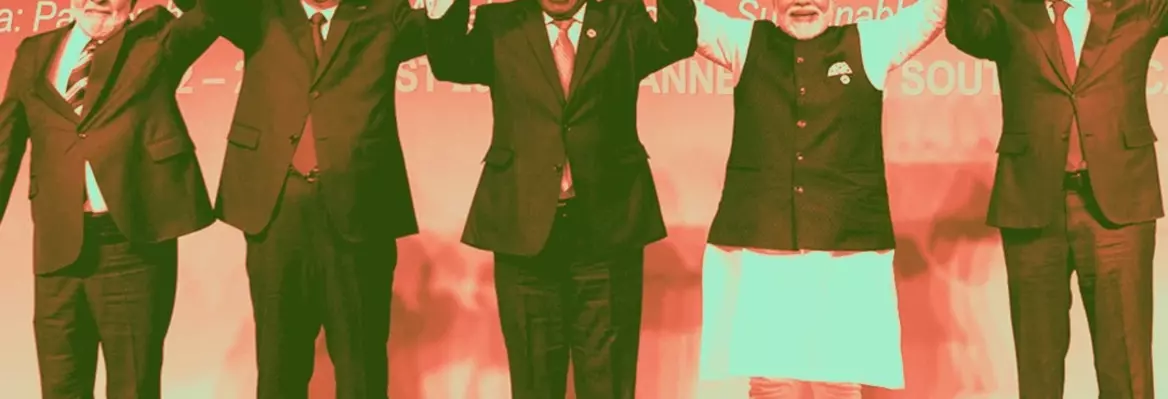BRICS, the acronym for a group formed by the counties of Brazil, Russia, India, China, and South Africa, has been touted as an anti-Western alliance with the power to usher in new world order. Sergei Guriev argues it is nothing of the sort.
He has had one of those lives fit for a Russian novel. Sergei Guriev served as a professor and the Rector of the most elite Russian university, the New Economic School in Moscow, advised the Russian President Dmitry Medvedev, sat on numerous Russian government advisory boards, only to find himself being the subject of a “frightening and humiliating interrogation” by government officials in 2013. He fled the country soon after.
Guriev witnesed up close Russia’s shift over the last decade from a Western-friendly regime with democratic aspirations, to an aggressive anti-Western spin-dictatorship – a term he coined to describe the new wave of authoritarian regimes who rule by spin and democratic pretence, rather than explicitly by fear. Though today Guriev believes Russia is rapidly moving back towards the “rule by fear” model. He has gone on to hold numerous prestigious positions, including his current leadership role at Science Po in Paris, one of France’s elite schools of government known for educating future politicians, diplomats and presidents. France's current president, Emanuel Macron is a graduate. So was his predecessor, Francois Hollande.
As the chief economist at the European Bank for Reconstruction and Development from 2016 to 2019, Guriev has a deep understanding of development banks, and capable of assessing perhaps the only concrete institution that has been born of the BRICS group so far: the New Development Bank. This bank has been set up as an alternative to what are seen as Western development organisations, such as the IMF and the World Bank, driven primarily by a Chinese agenda to undermine the dominance of the dollar as the world’s main currency, but also with the hope to exercise some softer power and widen the group's geopolitical influence, gaining the allegiance of nations who might struggle to get development loans otherwise.
I asked Guriev how he saw the claims about the potential economic power of the BRICS group, especially after the recent announcement of the addition of several new countries to their ranks, including Saudi Arabia, the United Arab Emirates, Iran, Ethiopia, Argentina, and Egypt, and whether the geopolitical influence of the group will help Russia in its war against Ukraine.
The Economic Power of BRICS
Under its new iteration, the BRICS+ group makes up approximately 32% of global GDP, compared with the G7 which makes up 30% of global GDP. How meaningful are these comparisons, and do these metrics translate into economic power – the ability to influence the direction of the global economy?
These comparisons are based on purchasing power parity (PPP) rather than GDP in market prices. E.g., in market prices G7 accounts for 45% of world GDP rather than 30% (based on PPP) – thus way ahead of the share of BRICS with or without new members. Total GDP in PPP represents how much the national income can buy domestically; it may provide some indication in case, for example, of defense spending. But it is meaningless for understanding the weight or a country or a country block in the global economy.
How significant is the power of the New Development Bank as a counterpoint to the World Bank and the IMF?





















Join the conversation